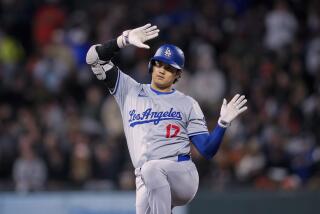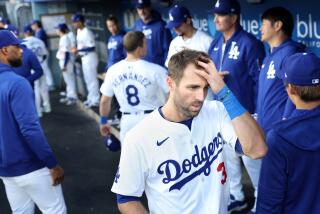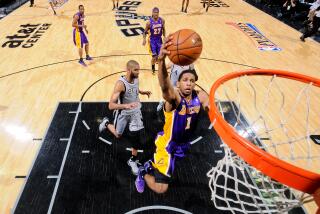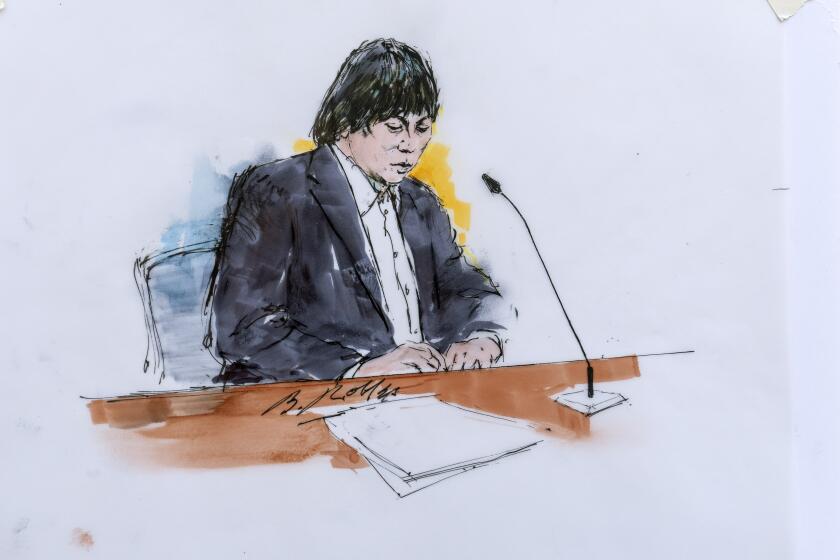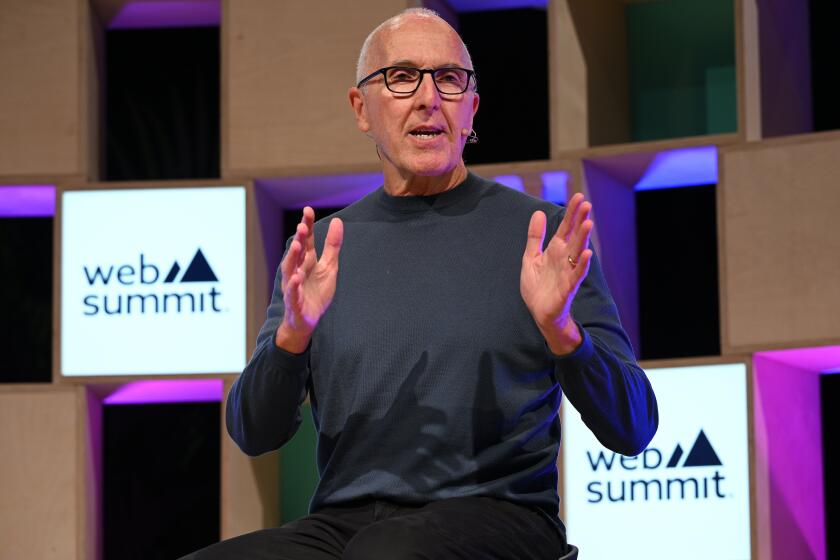Beat of His Own Drum
Chris Ward announced his arrival on pro surfing’s biggest stage, the World Championship Tour, by completing one of his trademark aerials during the second round of this season’s first contest in Australia.
Judges scored his ride a perfect 10 and he added a 9.5 to easily defeat Kalani Robb. He then swept aside, among others, legendary pros Taj Burrow and Kelly Slater on his way to the final, in which he lost to Australia’s Mick Fanning.
But the explosive rookie from San Clemente, one of the featured performers in the upcoming Honda U.S. Open of Surfing, had made a bigger splash. Ten years after most expected. Still trying to live down the infamous airplane incident in which he was removed from a jetliner in handcuffs.
His peers, who had long considered him the world’s best surfer not on the championship tour, perceived him as an immediate threat. The Assn. of Surfing Professionals, which governs the tour, called him a breath of fresh air.
“It was a hard road for Chris but he finally broke through,” said Wayne “Rabbit” Bartholomew, ASP president. “Nobody was more stoked at his WCT debut performance than me.”
While other top amateurs plunged straight into pro competition, Ward merely dabbled in it before taking a sharp detour. He became a free surfer, one of the best, shunning contests to star in videos and appear in magazines.
His freedom was limited, however. His father became seriously ill. When Ward was 18 he had a daughter, Malia, with his then-girlfriend. While many of his friends were living large on tour, he suddenly had pressing obligations.
He also had plenty of desire, though, and that’s what he says powered him through the rough times and, finally, onto surfing’s grandest stage, where his ultra-radical free-surfing style, while it has hurt him at times, has set him apart from others.
“Just because you’re the underdog doesn’t mean you can’t push the envelope too,” he said during a recent interview at his San Clemente home. “This is a whole different game for me. It’s challenging, but I like it.”
*
Ward, 26, will be among several WCT athletes in a field of 220 competing in the U.S. Open, a six-star World Qualifying Series contest that runs Monday through July 31 at Huntington Beach Pier. Junior surfers begin competition Friday and will finish Sunday, when trials begin for the Open as 35 surfers compete for the final eight slots in the opening round of 192.
The top 16 surfers in the WQS at season’s end advance to the next year’s WCT. Those on the WCT often surf WQS events for points they may need to re-qualify for the 44-man WCT.
The top 27 on the WCT automatically re-qualify and Ward is No. 19 with six contests left. He’s nursing a sore ankle, but says he will not be holding back -- he hasn’t since catching his first wave near the San Clemente pier on a bodyboard when he was 7.
The quiet community just north of Camp Pendleton remains a hotbed for top-level surfers. Local icons such as Dino Andino, Matt Archbold and Christian Fletcher were some of Ward’s mentors and eventually he was doing what they were doing, but with more flair.
“When he was 14 he was already doing some of the best maneuvers in the world,” recalled Andino, now a marketing manager at Oakley. “Instead of kicking out where the wave was closing out or sucking out, he would hit the lip straight on and do all kinds of crazy floaters or aerials.”
Andy Fomenko, a former pro surfer, became Ward’s first and only manager and treated him like a kid brother. Ward received his first sponsorship deal -- free gear and other stipends -- when he was 10. He signed a six-figure deal with Gotcha when he was 15.
Though he had been a standout amateur competitor -- he was the 1990 World Surfing Assn. menehune champion and was also winner of the National Scholastic Surfing Assn. boys’ title -- and showed promise on the WQS, he set aside his goal of becoming world champion.
This was during the video-boom and Ward’s sponsors were more interested in immediate exposure he would garner as a free surfer -- and he needed money. His father, Hugh, had learned he had a brain tumor and would require long-term treatment that insurance would not fully cover. His father is faring better today. Ward helps with expenses and recently bought his parents a new car.
Ward began globetrotting while in high school. Video and magazine crews focused on Ward because he was so dynamic and unpredictable. His travels took his mind off his troubles, but it also kept him from school. He would often return to an angry principal and mounds of homework.
“Pretty soon it got to where I couldn’t make up my work,” he said. “I’d put away one stack and then all of a sudden I’d have another, and I couldn’t get to it all.”
The demands eventually became such -- especially with a child on the way -- that he abandoned school. He was a breadwinner whose profession was to chase waves and showcase the brands of his sponsors.
His path often crossed that of the WCT, which has stops in Australia, Tahiti, Fiji and Hawaii, among other destinations. Ward mingled with pros such as Cory Lopez, Andy and Bruce Irons.
“I’ve always been there in their shadow, surfing by their side,” Ward said. “Just because I was not in contests with them doesn’t mean I felt out of place or anything.”
Perhaps, but the question kept arising: If “Wardo,” as he is called, is so good, why doesn’t he make a run for the world title? He was compared to Martin Potter, a free-surfing star in the 1980s, who ultimately answered critics by winning the title in 1989.
Ward felt his first pang of envy when friend Andy Irons, who is the same age, won the first of three consecutive world titles in 2001. Irons’ success and celebrity inspired Ward to commit to the WQS and try to make the WCT.
The two were alike in many ways. Irons’ success followed a period in which he struggled because he had become caught up in the rock-star lifestyle. Ward was likewise rough around the edges. Both were extremely fast and fluid on a surfboard.
Ward, who narrowly failed to qualify after the 2002 and 2003 WQS seasons, still wears some of his rough edges. Never has that been more apparent than during a flight two years ago from Miami to Brazil. He and Bobby Martinez of Santa Barbara were traveling to a WQS contest and soon after the plane touched down a rumor had spread through surfing circles that Ward had been arrested for attempted hijacking.
Ward says he had taken sleeping pills to get him through the long flight, and that he failed to respond quickly enough when the flight attendant asked him to raise his seat back.
He confesses that he was caught stealing a knife and fork from the aisle cart, and was later found to have also stolen beers and stuffed them in his backpack. He was denied entry into Brazil.
The contest was important, but Ward says it was principle more than anything else that led him to discover a way back to Brazil.
He caught a flight back to Miami, went to the Brazilian consulate and convinced the representative to issue a new visa. He bought a new airline ticket and made it to Brazil just in time for the contest, in which he advanced to either the semifinals or the final. He can’t remember, off hand.
But he does remember one thing: “The waves were starting to get really good the day I showed up,” he said with a smile, “that much I know.”
More to Read
Get our high school sports newsletter
Prep Rally is devoted to the SoCal high school sports experience, bringing you scores, stories and a behind-the-scenes look at what makes prep sports so popular.
You may occasionally receive promotional content from the Los Angeles Times.
